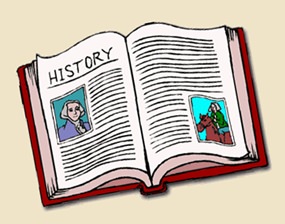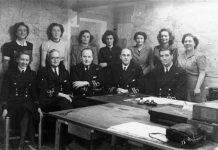Today is Saturday, April 9, the 100th day of 2016. There are 266 days left in the year.
Highlights in history on this date:
641 – An army commanded by Amr Ibn al-As conquers Egypt by seizing the Babylon fort in the Nile Delta. Alexandria capitulates the following November.
837 – Halley’s Comet makes its closest known passage to Earth: 5 million kilometers (3 million miles).
1609 – Spain signs nine-year truce with Holland.
1682 – French explorer Robert LaSalle, reaches the Gulf of Mexico after traveling down Mississippi River.
1783 – Tippoo of Mysore forces British to surrender Bednore.
1833 – First U.S. tax-supported public library is founded in Peterborough, New Hampshire.
1865 – Confederate Gen. Robert E. Lee surrenders his army to Union Gen. Ulysses S. Grant, ending the American Civil War.

1940 – German forces invade Norway and Denmark in World War II.
1942 – American and Philippine defenders on Bataan capitulate to Japanese forces during World War II; the surrender is followed by the notorious Bataan Death March, which claimed nearly 10,000 lives.
1948 – Jewish militia attack the Arab village of Deir Yassin in what is now Israel, killing more than 100 Arabs and forcing the rest to flee.
1949 – U.N. International Court of Justice delivers its first decision, holding Albania responsible for incidents in Corfu Channel and awarding Britain damages.
1963 – Britain’s former Prime Minister Winston Churchill is made an honorary U.S. citizen.
1971 – Jordan’s King Hussein accepts Syrian proposal to end two weeks of fighting with Palestinian guerrillas in Jordan.
1974 – India, Pakistan and Bangladesh sign agreement to repatriate 195 Pakistani prisoners of war.
1978 – Troops in Somalia crush attempted coup by army officers.
1986 – West Berlin expels two Libyan diplomats, says it suspects Libya of being behind bombing of Berlin discotheque.
1988 – China’s National Peoples Congress names Li Peng as premier.
1989 – Sixteen people are reported killed as Soviet troops rush crowd of protesters in a central square of Georgian capital, Tbilisi.
1990 – A three-decade ban on political activity is lifted in Nepal, and hundreds of thousands celebrate.
1991 – U.N. Security Council establishes a 1,440-member peacekeeping force to monitor the Iraq-Kuwait border and the withdrawal of U.S. forces from southern Iraq.
1992 – Sali Berisha is elected as Albania’s first noncommunist president since World War II; former Panamanian ruler Manuel Noriega is convicted in Miami of eight drug and racketeering charges.
1994 – U.S., French and Belgian troops arrive in Rwanda to evacuate foreigners from the country, torn by tribal warfare.
1995 – President Alberto Fujimori wins a second five-year term in Peru’s first peaceful election since 1980.
1997 – An Iraqi passenger jet carrying Muslim pilgrims flies from an air base just outside Baghdad to Saudi Arabia in defiance of U.N. sanctions.
1998 – Some 150 Muslims are trampled to death in a stampede in Mecca, Saudi Arabia, on the last day of the annual hajj pilgrimage.
1999 – Niger President Ibrahim Bare Mainassara is assassinated by his personal guard unit. The guard commander declares himself the new president two days later.
2001- Rioting breaks out in Cincinnati, Ohio, erupting out of what had begun as a peaceful demonstration against the shooting two days earlier of an unarmed black youth by the police.
2002 – The funeral of Queen Elizabeth, the queen mother, is held in London’s Westminster Abbey.
2003 – U.S.-led forces take control of Baghdad, the Iraqi capital, after U.S. Marines entered the city from the east to link up with U.S. soldiers controlling the western and southern approaches to the city.
2005 – Haitian police shoot and kill Remissainthe Ravix, a prominent rebel leader who helped force former President Jean-Bertrand Aristide into exile the previous year.
2006 – Australia’s foreign minister denies U.N. accusations that his department was involved in alleged kickbacks paid by the country’s monopoly wheat exporter to Saddam Hussein’s regime.
2007 – Iran announces a dramatic expansion of uranium enrichment, saying it has begun operating 3,000 centrifuges in defiance of U.N. demands it halt the program or face increased sanctions.
2008 – The Olympic torch touches down in San Francisco, its only stop in North America, where the relay is cut short and the closing ceremony is relocated because of demonstrations against China’s human rights record in Tibet.
2009 – Britain’s top counter-terror police officer resigns after he was photographed carrying clearly visible secret documents about an operation against an alleged al-Qaida plot by Pakistani nationals to launch an attack in Britain.
2010 – Russia threatens to suspend all child adoptions by U.S. families after a 7-year-old boy adopted by an American woman was sent alone on a one-way flight back to Moscow with a note saying he was violent and had severe psychological problems.
2011 – Thousands of demonstrators barricade themselves in Cairo’s central square with burned-out troop carriers and barbed wire and demand the removal of the military council ruling Egypt, infuriated after soldiers stormed their protest camp overnight, killing at least one person and injuring 71 others.
2012 – Syrian forces open fire across two tense borders, killing a TV journalist in Lebanon and wounding at least six people in a refugee camp in Turkey on the eve of a deadline for a cease-fire plan that seems all but certain to fail.
2013 – Al-Qaida’s branch in Iraq and the most powerful rebel group in Syria have officially joined ranks against President Bashar Assad to forge a potent militant force in the Middle East.
2014 – A 16-year-old boy slashes 21 students and a security guard at a suburban Pittsburgh high school, critically wounding at least five students, before an assistant principal tackles him.
2015 – U.S. Secretary of State John Kerry and Cuban Foreign Minister Bruno Rodriguez meet in Panama, the highest-level meeting between the two countries in more than half a century.
Today’s Birthdays:
Charles Pierre Baudelaire, French author (1821-1867); Leon Blum, French socialist statesman (1870-1950); Paul Robeson, U.S. singer (1898-1976); Sir Robert Helpmann, Australian ballet star-actor (1909-1986); Joern Utzon, Danish architect (1918-2008); Jean-Paul Belmondo, French actor (1933–); Paulina Porizkova, Czech model-actress (1965–); Hugh Hefner, Playboy creator (1926–); Cynthia Nixon, U.S actress (1966–).
Thought for Today:
The man who is born with a talent which he is meant to use finds his greatest happiness in using it — Johann von Goethe, German writer and statesman (1749-1832)
Copyright 2016 The Associated Press. All rights reserved. This material may not be published, broadcast, rewritten or redistributed.




